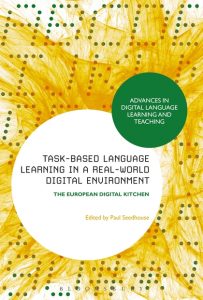The digital kitchen project has recently culminated in the publication of a new book, edited by Paul Seedhouse – ‘Task-Based Language Learning in a Real-World Digital Environment: The European Digital Kitchen’. The book is published by Bloomsbury and available from February 2017.
Here is the publisher’s description of the book:
How can you use the latest digital technology to create an environment in which people can learn European languages while performing a meaningful real-world task and experiencing the cultural aspect of learning to cook European dishes? This book explains how to do this from A to Z, covering how a real-world digital environment for language learning was designed, built and researched by researchers in Newcastle University (ECLS and Computer Science), Germany, Finland, Italy and Spain.
The project makes language learning motivational and fun by tapping into people’s interest in both cooking and technology – you can learn a language while cooking and interacting with a speaking digital kitchen. The kitchens provide spoken instructions in the foreign language on how to prepare European cuisine. Digital sensors are inserted in or attached to all the kitchen equipment and ingredients, so the digital kitchen detects what learners are doing and gives them feedback. Learners are also able to communicate with the kitchens and can ask for help via photos and videos if they don’t understand any foreign language words.
Based on two research grants, the book provides five research studies showing the learning experiences of users in five European countries. The book explains the principles and procedures involved in the project, enabling others to design and implement a real-world digital learning environment in the same way. It includes numerous photographs of the system in use and evidence of how and what 250 users actually learnt. A tasty blend of applied linguistics, digital computing and world cuisine!
